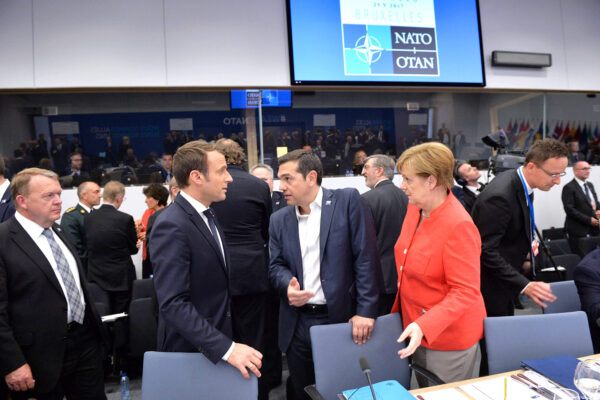
Eric Maurice writes in EUobserver that French president Emmanuel Macron’s biggest challenges comes from Berlin, where Angela Merkel and her conservative party are skeptical of plans to create a European Monetary Fund and establish a European deposit insurance scheme to protect savers:
Although the two plans were initiated by the EU before Macron took them, their rejection would signal a clear rebuttal of the French president’s more ambitious proposals for the longer term.
Merkel hasn’t ruled out a European Monetary Fund, but — like the Dutch and other deficit hawks in the north of Europe — she wants it to be an “intergovernmental”, as opposed to an EU-led, institution.
Germany isn’t in favor of creating a eurozone budget and finance minister either.
I predicted in September that these would be the most difficult items on Macron’s wishlist, but other things are still doable: harmonizing corporate tax rates and asylum procedures, creating an EU military intervention force, reforming the Common Agricultural Policy.
CIA director met with Kim Jong-un
The Washington Post reports that Mike Pompeo, Donald Trump’s CIA director and candidate for secretary of state, traveled to North Korea over the Easter weekend to meet with Kim Jong-un.
The purpose of the meeting — the highest-level between North Korea and the United States in two decades — was to lay the groundworks for a summit between the two leaders, which could happen as early as June.
About a week after Pompeo’s visit, American officials said Kim was willing to negotiate about denuclearization.
Experts are skeptical. North Korea has played bait-and-switch before. But the current climate is surely preferable from the beginning of the year, when Trump was threatening nuclear war.
What America should attempt in Syria
Adam Garfinkle argues in The American Interest that the best the United States can hope to achieve in Syria is weaken the Assadist-Iranian-Russian axis. Not by attacking Iranian proxies or Russian assets, but the elite Alawi units in the Syrian army:
Loyal manpower is the regime’s weakest link. The Alawi leadership does not trust other Syrians in these positions, so the more of these clansmen that are put out of action, the more the Russians and Iranians (directly or through Hezbollah and assorted Shia militias) will have to substitute for them to keep the war tilted in their favor. They have already bled at the hands of rebel opponents, but they must be made to bleed a lot more, translating into higher expenses and more casualties for both, before they will reconsider their policies.
Such an effort cannot wait much longer. Bashar Assad has reconquered nearly all populated parts of Syria, except a small area in the south and Idlib in the northwest. Should Idlib fall, the non-extremist resistance will be too weak to matter anymore and hence no Syrian proto-political parties will exist to reach a negotiated settlement with the regime.
American politics readings
- Julia Azari argues that the challenge of Trump’s presidency is legitimacy, not power. It’s not what Trump does, but why he does it. His actions seem to be driven by nepotism, personal loyalty and sometimes ethnonationalism.
- An example: the upcoming 2020 census and Republican attempts to sabotage it. Nils Gilman has more.
- Ryan Cooper writes that the American conservative movement has become a moral cesspool and somehow the people who once styled themselves the Moral Majority don’t care. “Presented with compelling evidence of gross moral misconduct on the part of practically any conservative elite, the great majority of Republicans look the other way, invent excuses or simply refuse to believe the evidence of their senses.”
- Matt Grossman and David A. Hopkins explain in The New York Times why there isn’t — and won’t be — a left-wing Tea Party. It’s the party asymmetry. Also read my review of their book.
